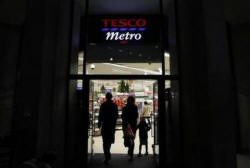|
 UK
inflation falls more than expected, reduces chance of
2014 rate rise UK
inflation falls more than expected, reduces chance of
2014 rate rise
 Send a link to a friend
Send a link to a friend
[August 19, 2014]
By Andy Bruce and Sarah Young
LONDON (Reuters) - British
inflation eased more than expected in July and the pace
of house price growth slowed in June, according to data
that underscored the Bank of England's message that it
is in no rush to hike interest rates. |
|
 Consumer prices rose 1.6 percent on the year in July, the Office for
National Statistics said on Tuesday, down from a five-month high of
1.9 percent in June. Consumer prices rose 1.6 percent on the year in July, the Office for
National Statistics said on Tuesday, down from a five-month high of
1.9 percent in June.
Economists polled by Reuters had forecast that inflation would fall
to 1.8 percent. After the data's release, they said the figures
reduced any remaining pressure on the BoE to raise interest rates
this year.
Last week, some economists pushed back their expectations for the
BoE's first rate increase, to February instead of November, after
the central bank slashed its forecasts for wage growth this year.
Sterling fell to a four-month low against the dollar and British
government bonds rose after the data.
Separate data showed annual house prices grew 10.2 percent in June,
down from 10.4 percent in May. The ONS said house prices rose 10.2
percent during the second quarter compared with a year ago, the
biggest annual increase since the third quarter of 2007.

But the first annual fall in factory-gate prices since 2009
underlined how weak inflation is by most measurements.
"This further eases the pressure on the BoE to consider near-term
interest rate rises and pushes the balance more in favor of a delay
to rate hikes versus our current November official view for the
first policy tightening move," said James Knightley, an economist at
ING.
Until last December, annual inflation had exceeded the Bank of
England's 2 percent target every month since December 2009, eroding
the spending power of households and making the fall in living
standards a political issue before next year's election.
The fall in inflation this year has helped the Bank of England to
hold off on raising interest rates, despite Britain's surprisingly
strong economic recovery.
Compared with the previous month, the consumer price index in July
was down 0.3 percent, the ONS said. The biggest negative
contribution to inflation in July was clothing and footwear.
[to top of second column] |

Growth in property prices continued to be led by London, where they
rose 19.3 percent in June, down slightly from 20.1 percent in May.
Other surveys have also pointed to slowing house-price growth,
including in London. Last week, the Royal Institute of Chartered
Surveyors suggested the London property market is starting cool off
quickly.
An underlying measure of inflation, which strips out increases in
energy, food, alcohol and tobacco, rose by 1.8 percent on the year
in July.
The ONS said consumer price inflation for the second quarter as a
whole was 1.7 percent - in line with the BoE's estimate for the
period.
Data also released by the ONS on Tuesday showed that factory-gate
prices fell by 0.1 percent in annual terms, the weakest level since
October 2009 and slightly below economists' predictions for no
change.
(Editing by Larry King)
[© 2014 Thomson Reuters. All rights
reserved.] Copyright
2014 Reuters. All rights reserved. This material may not be
published, broadcast, rewritten or redistributed.
 |